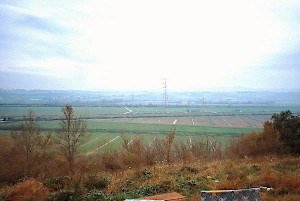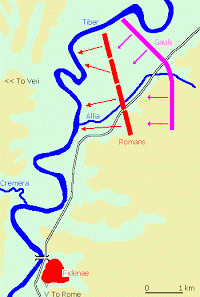Allia (387 or 386 BCE)
Q369581Allia: name of a little river, northeast of Rome, where the Romans suffered a severe military defeat against the Celtic Senones in 387 or 386 BCE.

In 387 or 386 BCE (or 390 according to the Varronian chronology), an army of Celtic (or Gallic) mercenaries that was allied to the tyrant of Syracuse, Dionysius I, marched through the valley of the Tiber. The Romans tried to repel them at a brook called Allia, but they were not accustomed to the "shock and awe" way of fighting of the Gauls. Almost immediately after the two armies had made contact, the Roman commanders ordered the retreat. This is how the Roman historian Livy describes the fight:
The consular tribunes had secured no position for their camp, had constructed no entrenchments behind which to retire, and had shown as much disregard of the gods as of the enemy, for they formed their order of battle without having obtained favorable auspices. They extended their line on either wing to prevent their being outflanked, but even so they could not make their front equal to the enemy's, whilst by thus thinning their line they weakened the centre so that it could hardly keep in touch.
On their right was a small eminence which they decided to hold with reserves, and this disposition, though it was the beginning of the panic and flight, proved to be the only means of safety to the fugitives. For Brennus, the Gaulish chieftain, fearing some ruse in the scanty numbers of the enemy, and thinking that the rising ground was occupied in order that the reserves might attack the flank and rear of the Gauls while their front was engaged with the legions, directed his attack upon the reserves, feeling quite certain that if he drove them from their position, his overwhelming numbers would give him an easy victory on the level ground. So not only Fortune but tactics also were on the side of the barbarians.
In the other army there was nothing to remind one of Romans either amongst the generals or the private soldiers. They were terrified, and all they thought about was flight, and so utterly had they lost their heads that a far greater number fled to Veii, a hostile city, though the Tiber lay in their way, than by the direct road to Rome, to their wives and children.note

Since Rome was too big to have a city wall, the soldiers went to nearby Veii, which was not a hostile city, as Livy implies, but a town already captured by the Romans. It had a strong wall. As a result of this withdrawal, the city was occupied by the Gauls, who tried to capture the Capitol. According to a famous story, the hill was saved by geese, which woke up the guards, who had fallen asleep. After a siege of seven months, the Roman garrison bought its freedom for 1000 pounds of gold.
The battle was less disastrous than later Roman historians assumed, but nevertheless, the "day of the Allia" (18 July) was considered to be an unlucky one for centuries to come.